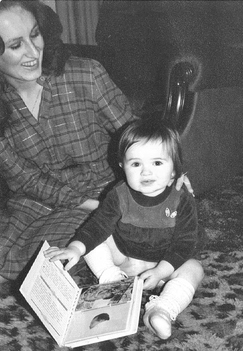
Addiction is insatiable -- not satisfied with devouring your parent's life, it goes after the family too; it wants your tears, your time, your undivided attention.
For too many years my family's mainstay of conversation was my sister's alcoholism. Addiction is the consummate headline grabber -- the triumphs and tribulations of everyone else pale by comparison to its narcissism, its relentless life and death dramas.
Over the years, my niece, Rebecca, and I actively decided to talk less about her mother's alcoholism as we realised it was not just defining her identity, it was eroding ours too. But, two and a half years after my sister, Coral, drank herself to death, here we are talking about it again. That's the thing with addiction -- its legacy lasts long after its own demise.
But we are determined to face this down once and for all -- this is a survivor story...
 I watched my niece grow from toddler to teenager, an only child hand in hand with my older sister, a single mum (see photos). Just the two of them (three if you count the booze) snuggled up against the world it seemed, at times, because nothing is ever all bad -- that's what makes it so confusing.
I watched my niece grow from toddler to teenager, an only child hand in hand with my older sister, a single mum (see photos). Just the two of them (three if you count the booze) snuggled up against the world it seemed, at times, because nothing is ever all bad -- that's what makes it so confusing.
An alcoholic parent drifts in and out of a child's life like a magician -- both magical and monstrous, saviour and destroyer, all at once there and then not there. They don't mean to enchant you and terrify you so tenderly and painfully, but they do it all the same.
My sister could be a charming, funny, soft-hearted mother. I recall her coming home in high spirits one night when I was babysitting Rebecca, who at four-years-old was determined to stay up late. We all went to bed with a midnight feast. Coral was a great joker and we laughed until we cried before Rebecca finally fell asleep on the pillow between us: "Look how perfect she is," my sister said.
Rebecca, now 35, remembers: "There were some really scary moments -- when I had to go into hospital with her in an ambulance, coming home to her passed out or the house wrecked from the aftermath of an argument. I also had times of feeling ignored or not cared about as she seemed so self-absorbed."
Since my recent blog post, Relapsed Alcoholic? This is for YOU, I have read many personal accounts from adult children of alcoholics (ACoAs). Survivors often grapple with recurring themes such as: loss and grief, anxiety, guilt, low self-esteem, anger, an inability to let go and enjoy life, and a feeling of being lost or different.
Psychologist Dr. Janet G. Woititz lists 13 common traits of ACoAs in her book, Adult Children of Alcoholics (1983). Many are relevant to all kinds of dysfunctional families and not all will apply but it's worth checking them out if you haven't already. Trauma reactions such as numbed emotions and memory blocking are also common.
Rebecca can relate to some of this: "I think I have blocked out a lot over the years but I've also had many feelings of anger, sadness and frustration, disappointment, desperation and fear. Looking back now, probably the saddest thing is that Mum never got to spend much time with my children. Also, I now realise, I didn't really know who she was."
But you CAN rise from the ashes. With the help of family, friends, counselling and a loving husband, my niece has found peace and is now an extremely loving mother of two young boys. Rebecca is clever, calm, capable, stable, and has never had any addiction issues herself, but most of all she is a survivor.
Together we have put together our top five tips for surviving an alcoholic parent:
1. a. Stop blaming yourself -- for ANY of it. It's not your fault. You know that, right? Everyone knows it but ask yourself, are you really feeling and living guilt free? A child's brain often processes negative events by self blaming. That sense of shame and guilt can linger into adulthood. Remember, you weren't, aren't and never will be responsible for this addiction. LET. THE. GUILT. GO. b. Stop blaming them. Not because it's not their fault (though it might not be) but because every minute you spend wishing they were different is another minute they've stolen. It's pointless and draining. Facts: You were let down very badly. You lost part of your childhood. You're traumatised. It hurts like hell. Acknowledge it but don't let them take any more of you. Stop the emotional investment...
2. Set your boundaries NOW. I don't care if you're a living saint, addiction is TOXIC -- if you're in its path it will poison you. Don't let it. Know exactly how many hours of your life each week/month/year you are prepared to sacrifice -- include the time you spend thinking and talking about it -- whether it's grieving over the past or dealing with an addict in the present. Decide what you are prepared to do and not do. Write down these boundaries. Pin them somewhere visible. Stick to them like your life is at stake.
3. Love yourself the way you wanted to be loved. If you grew up in the shadow of addiction the chances are you were invisible a lot of the time. Now it's YOUR turn to be seen and heard. Love yourself like a good mother would -- with boundless compassion. Listen to yourself. Most of all, give yourself the time you were never given; time to build your identity, discover what you're good at, what you love and hate. Find your voice and TALK your way through the past and into the future with a therapist or friend. Make yourself a priority.
4. Find your tribe. ACoAs often feel alone and abandoned, unloved and unlovable, so it's even more important to build a network of supportive friends, family and mentors who you can express yourself freely with. Cast the net far and wide to find inspirational or likeminded people who really 'get' you, people who will respect you, reaffirm your identity and truly give a damn about your hopes, fears and dreams.
5. Have fun like your life depends on it. This is hard for some ACoAs but seriously, this is overdue. Your nervous system NEEDS to let go. The truth is, living with an alcoholic is THE most boring thing you'll ever do. All that burden of responsibility, being on edge 24/7, having to be the sensible one, the WHOLE time. Make it your mission to discover what makes your skin tingle, what makes you laugh out loud. Letting your hair down will not turn you into your parent, it will release you from the responsibility trap they put you in.
And Rebecca's final message: "This is YOUR life -- LIVE IT! Don't let it get away from you because of another person's addiction."
More support at Adult Children of Alcoholics
___________________
Need help with substance abuse or mental health issues? In the U.S., call 800-662-HELP (4357) for the SAMHSA National Helpline.

